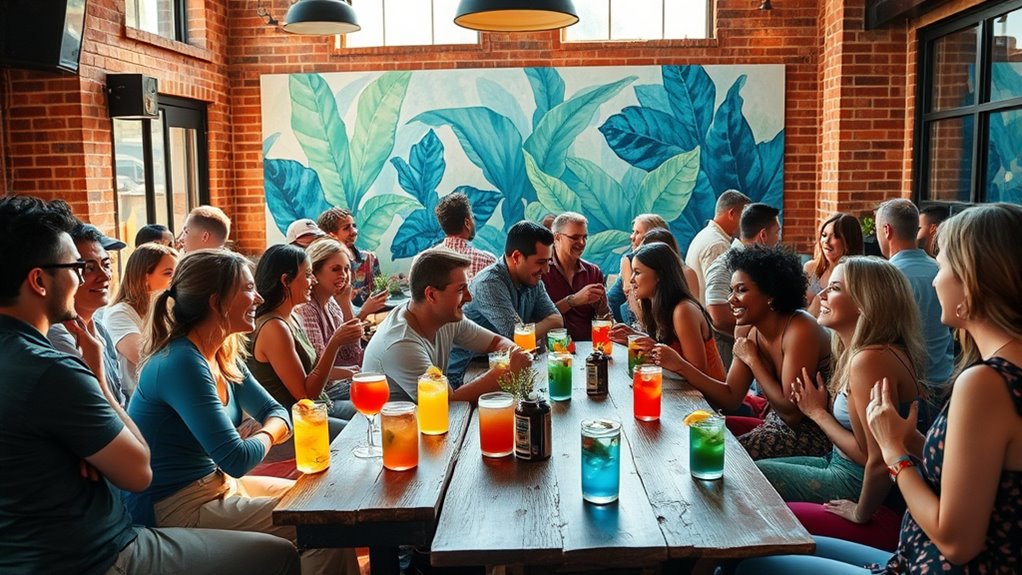Sober living is reshaping nightlife by creating a vibrant social movement that prioritizes alcohol-free events and supportive communities. You can enjoy community picnics, fitness classes, and creative workshops, all designed to foster connection and fun without alcohol. Building a peer support network helps you stay committed and find encouragement through local groups or online communities. Keep exploring how these innovations are making sober nights not only possible but exciting and fulfilling.
Key Takeaways
- Sober living promotes alcohol-free social events that foster community, connection, and enjoyment without alcohol dependence.
- The movement encourages redefining nightlife through activities like music, arts, fitness, and cultural events focused on sobriety.
- Peer support networks play a vital role in normalization and sustaining sober lifestyles within nightlife environments.
- It emphasizes integrating sobriety into long-term lifestyles, making alcohol-free choices socially rewarding and sustainable.
- Sober nightlife initiatives challenge traditional drinking cultures, creating inclusive spaces that celebrate health and wellness.

Have you ever wondered how to maintain your sobriety after leaving a treatment center? It’s a common concern, and the good news is, there are strategies to help you stay on track. One of the most effective ways is to immerse yourself in alcohol free events tailored for those in recovery. These gatherings aren’t just about avoiding alcohol; they’re about creating a lively, engaging environment where you can connect with others who share your journey. Whether it’s a community picnic, a fitness class, or a creative workshop, participating in alcohol free events gives you a sense of normalcy and joy without the pressure to drink. These activities replace old habits with new, healthy routines, making sobriety feel less like a sacrifice and more like an empowering choice.
Equally important is building a strong peer support network. Recovery isn’t something you have to do alone. Surrounding yourself with people who understand your struggles and celebrate your progress can be transformative. Peer support networks—whether through local groups, online communities, or mutual aid meetings—offer a safe space to share experiences, seek advice, and find encouragement. When you face challenges or cravings, reaching out to someone who’s been there can make all the difference. These connections foster accountability and remind you that you’re not isolated in your journey. They help normalize your experiences and provide practical coping strategies, making it easier to navigate social situations and everyday stressors. Engaging with supportive environments can also reinforce your commitment to sobriety and help you develop healthy habits that last.
Integrating participation in alcohol free events with ongoing engagement in peer support networks creates a robust foundation for lasting sobriety. It’s about establishing a lifestyle where sobriety isn’t just a phase but a permanent part of your identity. As you attend more alcohol free events, you’ll find your social circle expanding with like-minded individuals who prioritize health and wellness. Simultaneously, ongoing support from peers keeps you motivated and resilient during tough times. Over time, these connections and activities become second nature, helping you build confidence and stability. Remember, recovery is a journey, not a destination, and the combination of enjoyable alcohol free events and strong peer support networks can make that journey fulfilling and sustainable.
Frequently Asked Questions
How Do Sober Living Communities Fund Their Operations?
You fund sober living communities through a mix of community sponsorship and grant funding. Community sponsorship involves local businesses, organizations, and individuals donating money or resources to support the community’s operations. Additionally, grant funding from government agencies or nonprofit foundations provides essential financial assistance. These sources help cover housing costs, staff salaries, and programs, ensuring the community can sustainably promote sober lifestyles and foster a supportive environment for members.
What Are the Common Challenges Faced by Sober Living Residents?
You might face challenges like overcoming stigma and building peer support, which are crucial for your recovery. Managing social situations can be tough due to lingering stigma, but engaging with supportive residents helps reduce feelings of isolation. Maintaining accountability and staying committed to sobriety require effort, yet peer support provides encouragement and motivation. Embracing this community helps you stay focused, while reducing stigma boosts your confidence and resilience in your sobriety journey.
How Do Sober Events Ensure Safety and Inclusivity?
Ever wonder how sober events stay safe and inclusive? You can achieve this by offering alcohol-free entertainment options that appeal to diverse tastes. Inclusive event planning, like accessible venues and clear communication, helps everyone feel welcome. You also guarantee safety through trained staff and responsible hosting. By focusing on these aspects, you create an environment where everyone feels comfortable, celebrated, and free to enjoy themselves without alcohol.
Can Sober Living Be Integrated With Traditional Nightlife Venues?
Yes, you can integrate sober living with traditional nightlife venues by creating alternative venues that cater to sober individuals. These spaces foster social integration without alcohol or drugs, making them inclusive and welcoming. By collaborating with existing venues or establishing new ones, you provide a safe environment for everyone to enjoy nightlife, promoting healthier choices and helping sober individuals feel connected and engaged in social activities.
What Policy Changes Support the Growth of Sober Living Movement?
You can support the growth of the sober living movement by advocating for legal reforms that promote alcohol-free spaces and clearer regulations for sober venues. Community advocacy plays a crucial role by raising awareness, encouraging inclusive policies, and fostering partnerships with local businesses. These changes create a more welcoming environment for sober individuals, helping to expand sober nightlife options and guarantee sustainable growth within this social movement.
Conclusion
By embracing sober living, you’re part of a movement that’s reshaping nightlife for the better. Did you know that nearly 40% of young adults now choose alcohol-free venues? This shift shows more people are prioritizing health and community over intoxication. So, whether you’re seeking a safer space or just want to enjoy socializing without the haze, you’re helping redefine what nightlife can be—more inclusive, vibrant, and mindful. The future of fun is sober, and you’re leading the way.









